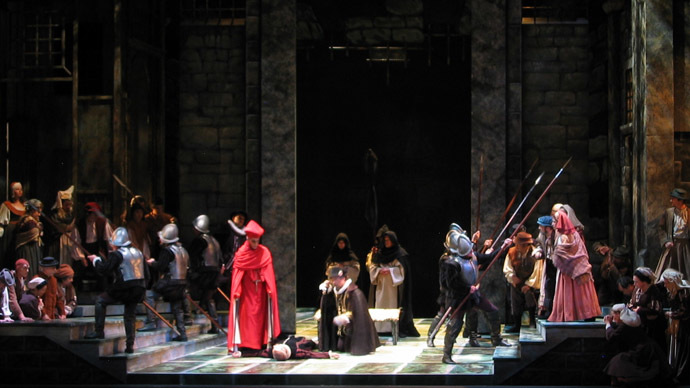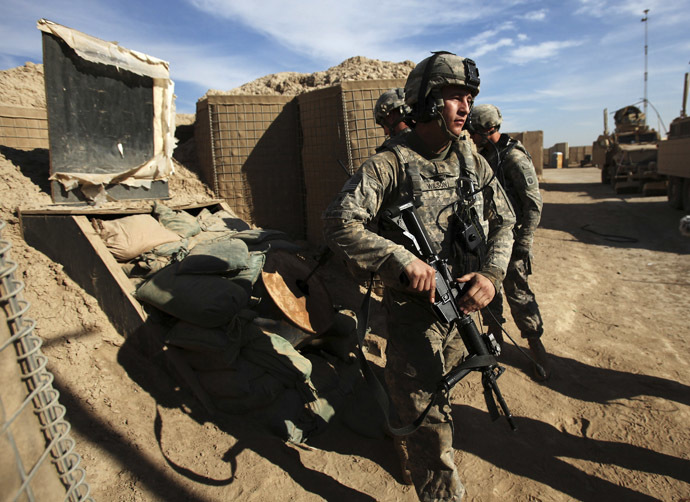Modern Verdi: The abuse of power on stage and in life

Watching the opening night of Vancouver Opera’s Don Carlo, it was hard not to find resonance with current affairs.
While Verdi’s opera was based on a play by Friedrich Schiller about Philip II of Spain, the original text explored the ideals of liberte, egalite and fraternite born out of the French Revolution, mirrored by Verdi’s own dream of unified Italy, liberated from Papal rule. Schiller was famous for his play “The Robbers” in which the hero proclaims “Liberty or death!” as well as for penning the lyrics to Beethoven’s “Ode to Joy.”
Verdi himself was revolutionary in more ways than one: musically, he liberated Italian opera from the fussy bel canto (“beautiful singing”) style; politically, his work often expressed his “free thinking” libertarianism. Verdi was an engaged composer whose operas were rife with political meaning cleverly disguised to confound censors.
While it would have been tempting to set the opera in modern times, it’s almost stronger in its historical setting. You do not need updated sets and costumes to experience a certain contemporary resonance with a self-absorbed Spanish court, the ghost of an Emperor, an Inquisition and wars abroad terrorizing civilians.
As Mark Swed wrote in an LA Times review of a 2006 LA Opera production, Don Carlo is about “the abuse of power. Terrorism is enforced by religious extremists controlling government. A popular uprising is the result of an unpopular war in which a superpower is ensconced in a distant land where it isn't wanted.”
Philip II, son of Charles V, whose ghost famously haunts Don Carlo, oversaw the golden age of the Spanish empire. His various military campaigns in foreign lands, most notably in Flanders where, as depicted in the opera, he brutally suppresses a Protestant uprising (“With so much blood I have paid for the peace of the world,” he sings) were funded by the pillaging of the “New World” and by heavy taxation throughout his empire. In spite of this, his exchequer faced bankruptcy several times.
Indeed, other operas by Verdi appear uncannily prescient. In “I Lombardi,” Griselda sings: “God's just cause is not served by soaking the earth with human blood,” and “You covet the Muslims' wealth, this is not heaven's desire!”
Empires come and go, of course. Now there is a Protestant one “ruling half the world” (as Philip II’s is described in Don Carlo), where two-thirds of the population are Evangelicals who justify the conquest of much of the Muslim world on some rather arcane doctrinal blather about Armageddon and the return of the Jews to the “Holy Land.”

And as the violence in Iraq goes on unabated in the disastrous aftermath of an invasion that took place 11 years ago, I think Verdi would have appreciated David Hare’s play “Stuff Happens.” While Verdi took the historical reality of Philip II’s expansionist empire as the basis for his opera, his focus was on the inner drama between the monarch and his son, Don Carlo, who are both in love with the same woman. Hare’s success with “Stuff Happens” was in taking de facto transcripts of conversations in the White House between the likes of George Bush, Colin Powell and Condoleezza Rice, and turning them into compelling drama.
If Verdi were alive today, I could imagine him turning “Stuff Happens” into an opera, albeit with some embellishment – perhaps a little father/son intrigue between Bush Jr and Snr and Condoleezza Rice? Powell could play the Marquis of Posa, who gets crushed in the ensuing power play. And perhaps the Grand Inquisitor could become Pat Robertson – a man who seems equally obsessed with punishing “infidels.” I even see a role for Fareed Zakaria – that obsequious beltway courtier – as lady-in-waiting Princess Eboli, who tries to seduce both father and son.
Of course, the infamous “burning of the heretics” scene could be transposed to a waterboarding one – or perhaps even the interior of a drone. After all, the war on terror is so the new auto-da-fé (act of public penance before an execution - RT).
Verdi’s Don Carlo – which, as opera buffs know, ends very badly – even evokes the hopes and betrayals of the “Arab Spring” – now more than three years into its tragic denouement.
The character of Philip II’s arrogance, as he gives the green light to the murder of his political opponents (“Oh people while placing on my head this crown,/Unto heaven that gave it me I swear/,All heretics with fire and sword to extirpate”) resonates not only with more contemporary leaders of superpowers, but also the ongoing dramas between “rebels” and authoritarian regimes who each believe God is on their side, whether in, Aleppo, Anbar province, Cairo or Donetsk – as do the poignant appeals of the deputies from Flanders to the king, “A hapless nation now implores thee,/…Take pity on us! save our native land!”
The world is certainly ripe for a new Romantic moment and a Don Carlo-like champion. Indeed, there is certain nostalgia for the days of Verdi, when political causes seemed somehow less muddied, and more black and white. But as anyone who watches the opera with its dramatic subplots, twists and turns and troths and betrayals can attest it expresses that age old reality of human drama, whether personal or political: everyone has their own agenda.
Hadani Ditmars for RT
The statements, views and opinions expressed in this column are solely those of the author and do not necessarily represent those of RT.
The statements, views and opinions expressed in this column are solely those of the author and do not necessarily represent those of RT.











